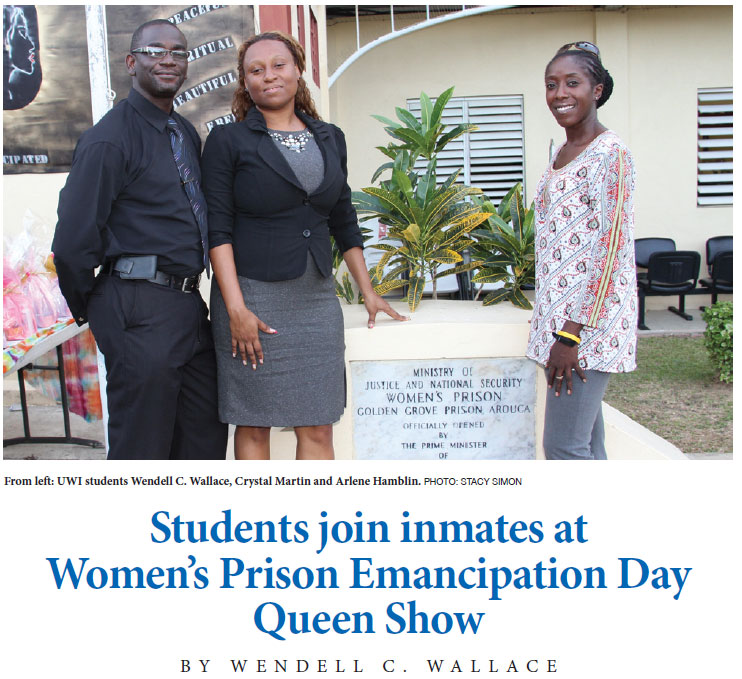
In Criminology and Criminal Justice, there has always been a discourse on deterrence versus rehabilitation as it relates to individuals who come into contact with the criminal justice system. With crime apparently spiralling out of control in Trinidad and Tobago and attempts at deterrence seemingly failing, rehabilitation of offenders seems a viable option.
While many students at the Campus are engaged in prison research at prison facilities in Trinidad and Tobago, few have chosen to return to share the results with the institutions. Part of the Criminology Unit’s focus is on outreach efforts aimed at giving back something tangible to the society while conducting meaningful research.
So we were happy to respond to the invitation of undergraduate Criminology student Nicole Huggins, who is attached to the Trinidad and Tobago Women’s Prison, to attend their Miss Emancipation Queen Show 2013. Arlene Hamblin (MSc student), Crystal Martin (MSc student in International Relations) and I attended, with Ms Martin taking on judging responsibilities. Prizes with a total value of $1,000 were personally donated to the Miss Emancipation Queen 2013 (Miss Gambia) by lecturer Dr. Randy Seepersad, Ms Martin and me on behalf of the Criminology Unit.
It was enlightening. The inmates excelled in the talent segment, evening gowns (every gown, headpiece and even items of clothing on display, were designed and sewn by inmates of the Garment Construction department at the Women’s Prison), and importantly, the intelligence segment where they had to answer several questions ranging from reparation and rehabilitation to the importance of Emancipation Day celebration for all races in Trinidad and Tobago. Three of the most provocative questions were: In recent years, it has been suggested that descendants of slaves should be compensated for the slavery experience. What are your views on compensation for descendants? Why is Emancipation a celebration for everyone and not just for Afro-Trinbagonians? What does the African slavery experience teach us about strength?
Answers to these particular questions above elicited rapturous applause from the audience. The Miss Angola representative answered question one by stating that she was against reparation for descendants of slavery as reparation fosters a continued culture of hopelessness and dependency and that while slavery was immoral we should learn from the experience and move forward. Miss Togo answered question two by stating that Emancipation Day celebration is important for all persons in Trinidad and Tobago as other races in Trinidad and Tobago had suffered from some form of bondage which required emancipation and that it is important to celebrate being emancipated. Ms Kenya’s response to the third question was to use her personal experience to demonstrate that despite the atrocities which the enslaved African endured; they showed strength, courage and determination and used a variety of means to survive the experience.
After this show we were more convinced that rehabilitation should be at the forefront of national crime reduction strategies. The Programmes Department of the Trinidad and Tobago Prisons Service should be commended for hosting this event.
–Wendell C. Wallace is a Doctoral candidate and part-time lecturer in Criminology and Criminal Justice, and budding Criminologist at the UWI St. Augustine Campus. |





